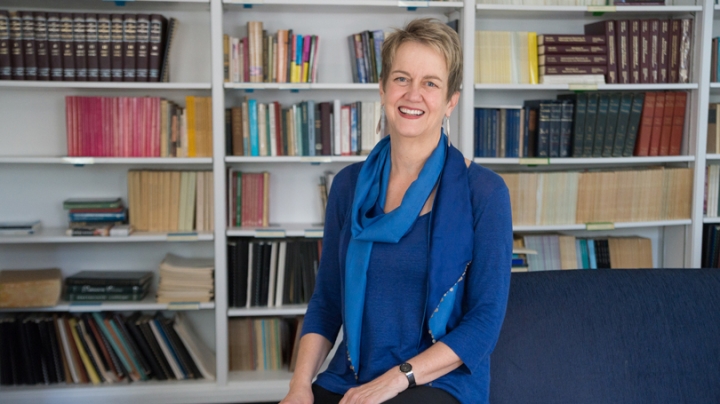Susan Brison, the Eunice and Julian Cohen Professor for the Study of Ethics and Human Values, will deliver the 30th Presidential Faculty Lecture at 4:30 p.m. on Wednesday, April 11, in the Filene Auditorium at Moore Hall. The talk is free and open to the public.
Brison, a feminist philosopher and expert on free speech whose work intersects with law, ethics, and politics, will speak on “Sexual Violence, Social Meanings, and Narrative Selves.”
“With the emergence of the #MeToo movement, people are asking questions that they weren’t asking before. The challenge for me as a philosopher is to say how philosophical thinking can help to illuminate some of these issues, if not resolve all of these questions,” she says.
The subject is not only timely; it’s personal. Brison has long been open about being a survivor of rape. In 1993, she published an article titled “Surviving Sexual Violence: A Philosophical Perspective,” which detailed the violent assault she had suffered three years earlier. Her 2002 book, Aftermath: Violence and the Remaking of a Self, revisits that crime and explores the philosophical meanings of trauma.
“There had been virtually nothing written about that in philosophy. A quarter-century ago, rape wasn’t considered a philosophical topic. You just didn’t talk about that,” she says.
In part, she says, the absence of rape as a philosophical subject reflects how male and white Western academic philosophy departments have historically been. But it also reflects a traditional aversion to bringing personal narrative into philosophical reasoning. “I was taught, and I think philosophy students are still taught, that what you should do as a philosopher is think with kind of a view from nowhere, as objectively as possible, and abstract away from all of your personal circumstances,” Brison says.
“That’s one way of viewing philosophy. But I think everybody who philosophizes brings their personal history into it. It’s not a coincidence that there was a lot of philosophy on, say, just war theory written by men, but there wasn’t philosophy on abortion until maybe the early ’70s, when women started writing about it.”
Brison says interest in feminist thought is stronger than it’s been in 25 years. “I was just this morning reading a USA Today primer on feminism—you know, first wave, second wave—in USA Today! So people are really talking about this.”
This term, Brison is teaching “Controversies in Feminist Philosophy,” an advanced seminar for philosophy majors. “I’ve never taught anything about feminism at that level in the philosophy department before, because I thought there wouldn’t be sufficient student interest,” she says.
Brison acknowledges that the current surge of activism and awareness around feminist issues may not last. “I really thought it was happening 25 years ago. I spoke out at my first Take Back the Night rally at Princeton in the spring of 1991,” she says. “It’s been frustrating to see how little progress we’ve made in areas like gender-based violence and sexual harassment. So part of me feels like we’ve been here before. A lot of us were speaking out then, and a few years later, there was a huge backlash.”
At the same time, she says, “I’m really optimistic about the young people.” She points to the student activism that organized last month’s March for Our Lives as well as the way #MeToo has changed the public conversation around sexual violence.
“I think there has been a cultural shift with the #MeToo movement. What’s new is it’s the first time that very successful, powerful white men have been held to account and have had some consequences.”
Sponsored by the Office of the President, the Presidential Lecture Series was established in 1987 by President James Freedman to honor the contributions of outstanding members of the Dartmouth faculty.
Brison says the lecture is “an opportunity to show the campus community—my colleagues outside of philosophy and outside of the arts and humanities—what’s going on in philosophy. I feel like it’s especially important now, when humanities are under siege across the country, that we show that there’s important work going on in the humanities.”
Attendees are invited to a reception immediately following the lecture.
Hannah Silverstein can be reached at hannah.silverstein@dartmouth.edu.

